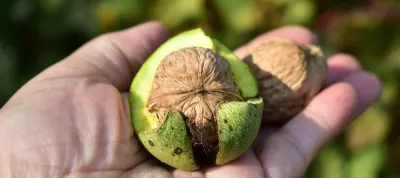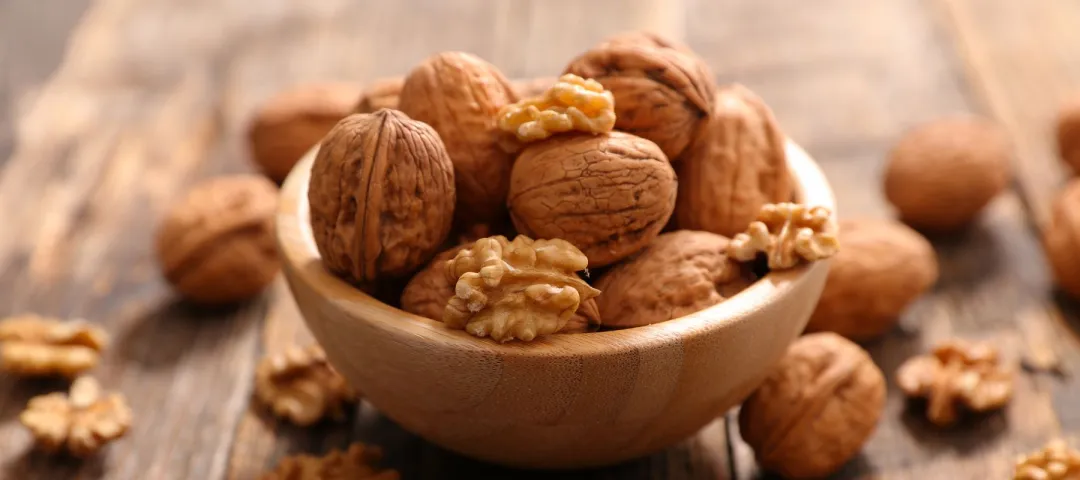General information
RDP Priority
- P2. Competitiveness
RDP Focus Area
- 2A: Farm’s performance, restructuring & modernisation
RDP Measure
- M04: Investments in physical assets
Beneficiary type
- Farmer / land manager
Summary
By investing in modern equipment and exploring value-added processing options alongside effective marketing strategies, Greek farmers growing walnuts, hazelnuts and kiwis can tap into significant business development opportunities offering enhanced economic viability.
Nikoleta Founta is a young Greek farmer from Xanthi, cultivating walnuts, hazelnuts and kiwis. She represents a success story, and her ‘Nuts Hellas’ company is a role model for modern Greek farming.
CAP funds helped her cover the costs of investing in new equipment and storage facilities to improve the production and processing of her plant-based agrifood products. Project expenditure included construction of a new warehouse structure and the supply of the necessary mechanical equipment for the management of permanent crops (walnuts, hazelnuts, kiwifruit). The project also covered costs linked to using a smart farming platform and agricultural advisory services.
Results
This investment project:
- boosted turnover by 30% in the first year from EUR 34 000 to EUR 44 000;
- reduced the time, labour, and fuel required to carry out agricultural work;
- increased profit margins by 20% from the sale of added-value processed products. The new equipment provides possibilities for selling the crop at times when market prices are more profitable;
- supported local employment through providing work for agronomists, agro-technicians and seasonal workers; and
- strengthened environmental protection by reducing risks to surface water and underground aquifers by preventing phenomena such as nitrate pollution and eutrophication. The new equipment reduces fuel consumption and greenhouse gas emissions. Also, the agricultural advice promoted good agricultural practice in conserving soil health.

Promoter
Nuts Hellas
Funding
Total budget 152 966 (EUR)
EAFRD: 72 659 (EUR)
National/Regional: 3 824 (EUR)
Private/own: 76 483 (EUR)
Keywords
Resources
Documents
Context
Greek agricultural products such as walnuts, hazelnuts, and kiwis present business development opportunities for farmers. The country's favourable climate and fertile soil create an ideal food production environment, and investments in modern agricultural equipment help farms capitalise on this potential. Upgrading machinery can enhance productivity, reduce labour costs, and improve the quality of harvests, e.g. modern precision machines can significantly decrease the time required to collect or process nuts, allowing farmers to allocate their resources more efficiently.
Adding value to walnuts and hazelnuts through processing can further improve the profitability of these crops. By establishing small-scale processing facilities or collaborating with existing ones, farmers can transform raw produce into higher-margin products that attract premium prices in domestic and international markets.
Additionally, smart farming applications can enhance farm management decisions by leveraging data analytics and real-time monitoring. These technologies facilitate precise resource allocation and enable predictive analytics that assist in forecasting crop performance and market trends. By analysing historical data alongside current conditions, farmers can make informed decisions regarding planting schedules and crop selection. This strategic approach helps reduce risks from climate variability and market fluctuations, fostering resilience within agricultural operations.
Nikoleta Founta is a young Greek farmer from Xanthi cultivating walnuts, hazelnuts and kiwis. She represents a success story, and her ‘Nuts Hellas’ company is a role model for modern Greek farming. She manages 12 Ha of hazelnuts, 55 Ha of walnuts, 6 Ha of kiwifruit, 40 Ha of wheat, 9 Ha of olives, and 5 Ha of cotton.
Objectives
The extensive size of Nikoleta’s holding created a need for new and innovative machinery that enables better management of cultivation operations, as well as improvement of the environmental footprint and reduction of the production costs. She also wanted to better optimise digitalised opportunities and take advantage of expertise provided by specialist agrifood advisors.
The objectives of her CAP-funded investment project were to improve:
- competitiveness of the agricultural holding by modernising production and adapting to market needs;
- environmental profiles across the farm and mitigate climate change risks by better management of soil, pesticides, and energy via innovative equipment; and
- management decisions using a smart farming application and expert advisory services.
Activities
An investment plan of EUR 152 966 was designed to modernise machinery and construct storage infrastructure. Project actions funded a new:
- 150 m2 storage warehouse for agricultural products and farm maintenance;
- 71Hp tractor;
- mobile walnut sorter;
- 1 000-litre sliding sprayer pump and electrostatic ioniser. This negatively charges the spray drops through an electrode at the end of each nozzle, enabling a wide and better application of sprayed plant protection products with very high safety and effectiveness;
- heavy duty 175 cm plant shredder with hydraulic displacement;
- innovative nut tree torso vibrator for optimal harvesting of walnuts. It protects branches and detaches fruits effectively;
- walnut peeler;
- 3-stage SAE walnut dryer and lift;
- walnut crushing line;
- weather station with a soil moisture and leaf moisture sensor; and
- smart farming advisory services focused on competitiveness, market adaptation, and reducing production costs.
Main results
Thanks to her CAP-funded investment project, Nikoleta’s company:
- boosted turnover by 30% in the first year from EUR 34 000 to EUR 44 000;
- reduced the time, labour, and fuel required to carry out agricultural work;
- increased profit margins by 20% from the sale of added-value processed products. The new equipment provides possibilities for selling the crop at times when market prices are more profitable;
- supported local employment through providing work for agronomists, agro-technicians and seasonal workers; and
- strengthened environmental protection by reducing risks to surface water and underground aquifers by preventing phenomena such as nitrate pollution and eutrophication. The new equipment reduces fuel consumption and greenhouse gas emissions. Also, the agricultural advice promoted good agricultural practice in conserving soil health.
Key lessons
- Vertical integration of product processing in EU farm businesses offers useful advantages, enhancing efficiency and profitability. By controlling multiple stages of production, farms can reduce transaction costs, streamline supply chains, and ensure product quality. This integration fosters innovation and responsiveness to market demands, ultimately contributing to better agricultural practices. Farms can also capture a larger share of the value chain by engaging directly with consumers or retailers. This strategic positioning enhances revenue, facilitating brand loyalty and consumer trust, all of which are crucial elements in today’s competitive agri-food sector.
- Smart farming applications can greatly enhance farm management decisions by leveraging data analytics and real-time monitoring. Integrating Internet of Things (IoT) devices in smart farming enhances operational efficiency through automation. Tasks such as irrigation management and pest control become streamlined processes that require less manual intervention. This not only saves labour costs but also allows farmers to focus on strategic planning and long-term sustainability initiatives.
"Wanting to get away from the annual classic crops of the area (wheat, sunflower, corn, cotton), we were looking for a tree crop, without the stress of direct harvesting. The walnut were the right crop for us. We started in 2011, when we planted the first 52 acres, choosing the Chandler variety, because it is the most commercial, the shell breaks easily, and the nut inside is attractively light-coloured. We love nature and take care of our land. We avoid the use of chemical weedkillers and pesticides harmful to the ecosystem as much as possible. We monitor the health of our trees and only intervene when and where necessary. This is how we managed to offer the consumer a healthy and tasty product of the best possible quality."
